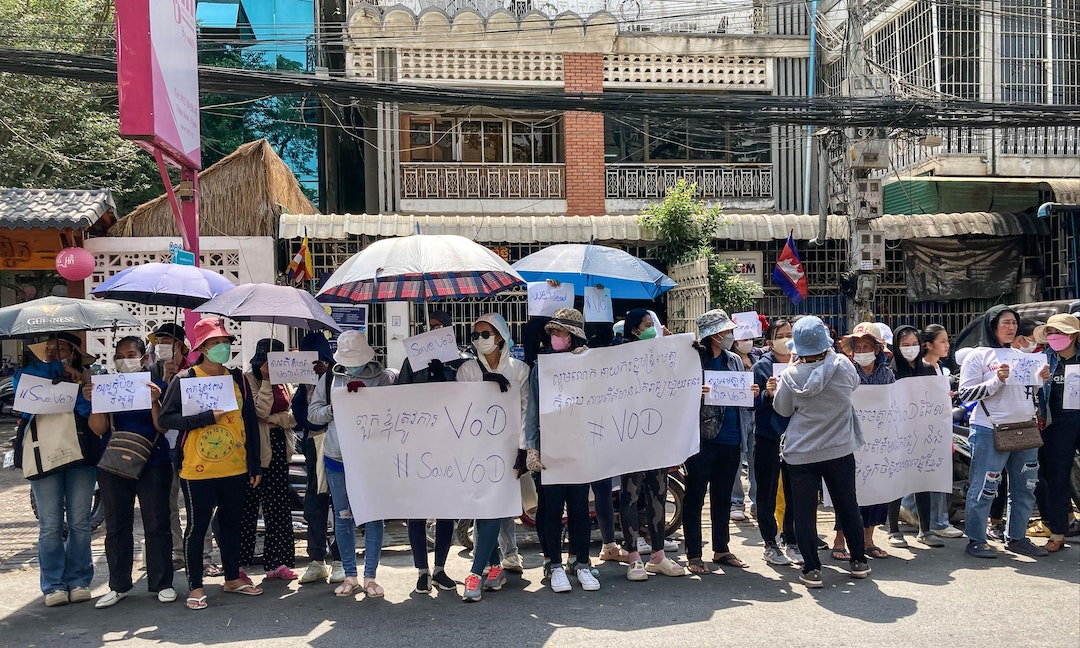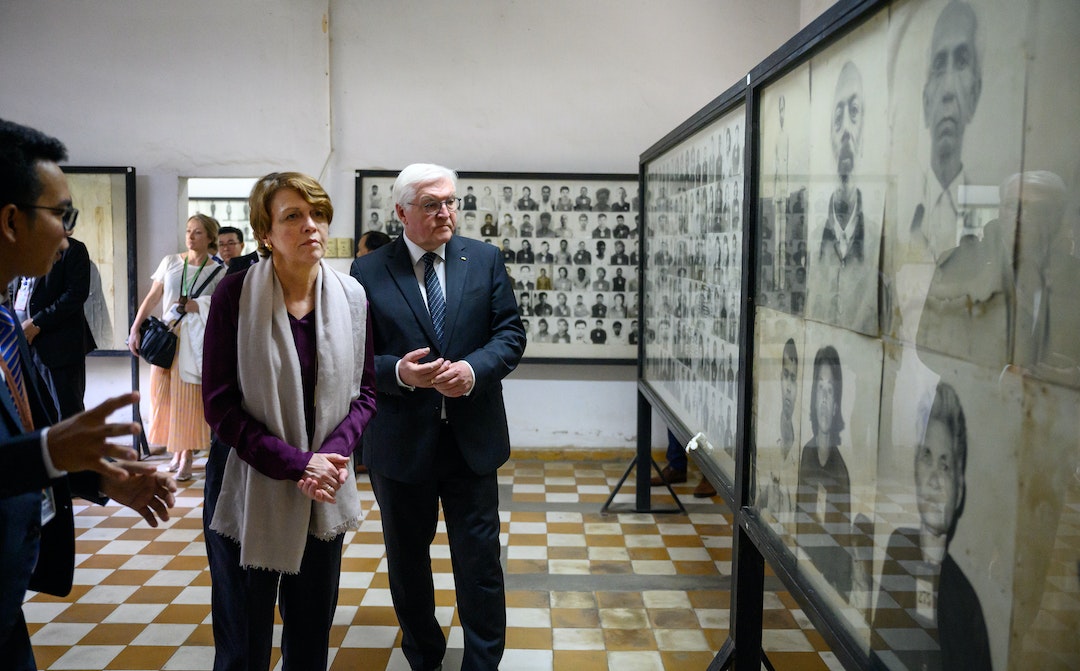
Attacks on opposition and activists are escalating in Cambodia, with the forced closure of Voice of Democracy (VOD) this week coming as Prime Minister Hun Sen is hosting German President Frank-Walter Steinmeier.
Hun Sen has been in power since 1985. The 70-year-old is expected to lead his ruling party through a largely-uncontested general election in July, with some speculating that he would later hand over power to his eldest son Hun Manet, the country’s de-facto military chief.
Many analysts believe that the clampdown on Voice of Democracy was an attempt to silence one of the country’s last remaining independent voices.
Rights group Amnesty International’s Hana Young decried the affair as “a blatant attempt to slam the door on what’s left of independent media in the country” and urged the prime minister to “withdraw this heavy-handed and disproportionate order.”
Germany hopes VOD will be back
The ban was announced the same day that Germany’s Steinmeier arrived in the capital Phnom Penh to start his Asian tour and the move is likely to raise questions about recent European rapprochement with Cambodia. The German president’s itinerary includes a meeting with Hun Sen.
A spokesperson for the German Foreign Ministry told DW they are ”deeply concerned” about the closure of VOD.
“Cambodia is losing an important independent voice,” they added. “This is bad news for press freedom and democracy. We hope that Voice of Democracy can resume its work soon.”

Ban triggered by VOD reporting Hun Manet approved aid to Turkey
The media ban followed a VOD report on February 9 that quoted government spokesperson Phay Siphan saying that Hun Sen’s son and nominated successor, Hun Manet, had approved a government decision to donate around €93,000 (US$100,000) in aid to Turkey after its recent earthquake.
The government denied that Hun Manet made this decision, with Hun Sen insisting that only he, and not his son, has the authority to decide on foreign aid. The prime minister demanded an apology. Manet, who is deputy commander-in-chief of the Cambodian military and not an elected official, also rejected the narrative.
VOD admitted to making a mistake, which was apparently due to the radio station erroneously quoting the spokesperson who was speaking about a separate matter.
The Cambodian Center for Independent Media, an NGO which oversees VOD and receives EU funding, issued a statement expressing its “regret” for the confusion. But this was not enough for the government. Following the ban, Cambodia’s Information Minister Kanharith Khieu wrote on Facebook that VOD’s demise should be “a lesson for other media outlets.”
Opposition leaders face court cases
Clamping down on government opponents is not rare in Cambodia. In 2017, the government forcibly dissolved the Cambodia National Rescue Party (CNRP), the largest opposition force at the time, on spurious accusations that it was plotting a U.S.-backed coup. Several news outlets were also closed in the run-up to the 2018 elections. In recent months, there was increased pressure on another anti-government faction, the Candlelight Party. This included defamation suits ending in heavy fines.
Hun Sen, a former Khmer Rouge commander, has threatened to dissolve any political challenger that he deems a threat to peace and which is deemed to “slander” the ruling party.
How has the West responded?
The EU was strident in its criticism of Cambodia’s democratic deterioration after 2017, which included the forced closure of other independent newspapers, including the outspoken Cambodia Daily that was shuttered on tax allegations. Brussels also suspended funding for Cambodia’s general election in 2018 and eventually revoked some of the country’s trading privileges in 2020.
The US, too, has criticized Cambodia, although its remarks were focused more on its ties with China. Washington believes Phnom Penh will allow the Chinese military access to its large naval base on the Gulf of Thailand. Hun Sen’s government has consistently denied that it has any secret naval base agreement with China.
And yet, Cambodia’s relations with Western democracies have improved somewhat over the past 12 months. Hun Sen received praise for backing Western condemnations of Russia’s invasion of Ukraine, and Cambodia even co-sponsored a UN General Assembly resolution against Moscow.
On the economic front, Cambodia’s exports to the EU rose by 25% to around €3.7 billion last year, according to a recent statement by Cambodia’s Commerce Ministry. The Asian country has also recently been the recipient of several funding packages from the European Investment Bank.
EU most likely to wait for elections in July
The ban on VOD has prompted criticism from the EU delegation in Cambodia and the embassies of a dozen EU member states. In a joint statement, European diplomats said the closure “seriously undermines media freedom and pluralism, which are essential for any open and free society.”
In response, a Cambodian Foreign Ministry spokesman was quoted by local media as saying such comments from foreign embassies express “politically-driven, prejudiced, and biased concerns.”
It is not yet clear if the escalating clampdown will affect the gradual rapprochement between Cambodia and the West. Most analysts expect the EU to wait and see the conduct of July’s general election before reassessing their options.
At the very least, the closure of a leading news outlet is likely to color the EU’s opinion ahead of the ballot.
“The presence of free media is part of the environment in which the elections will be held and judged,” a senior European official told DW.
Edited by: Darko Janjevic
This article was originally published on Deutsche Welle. Read the original article here.
READ NEXT: Rains and Floods Batter Philippines, Climate Activists Warn of More To Come
TNL Editor: Bryan Chou (@thenewslensintl)
If you enjoyed this article and want to receive more story updates in your news feed, please be sure to follow our Facebook.







